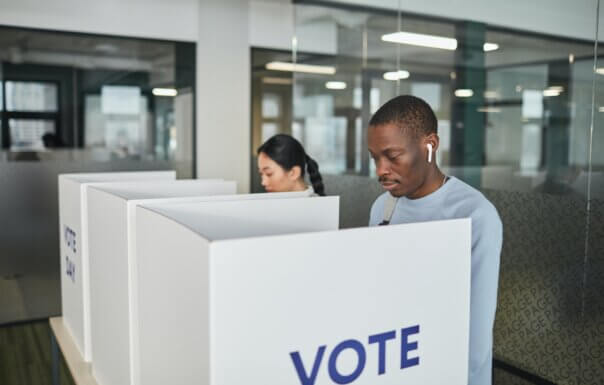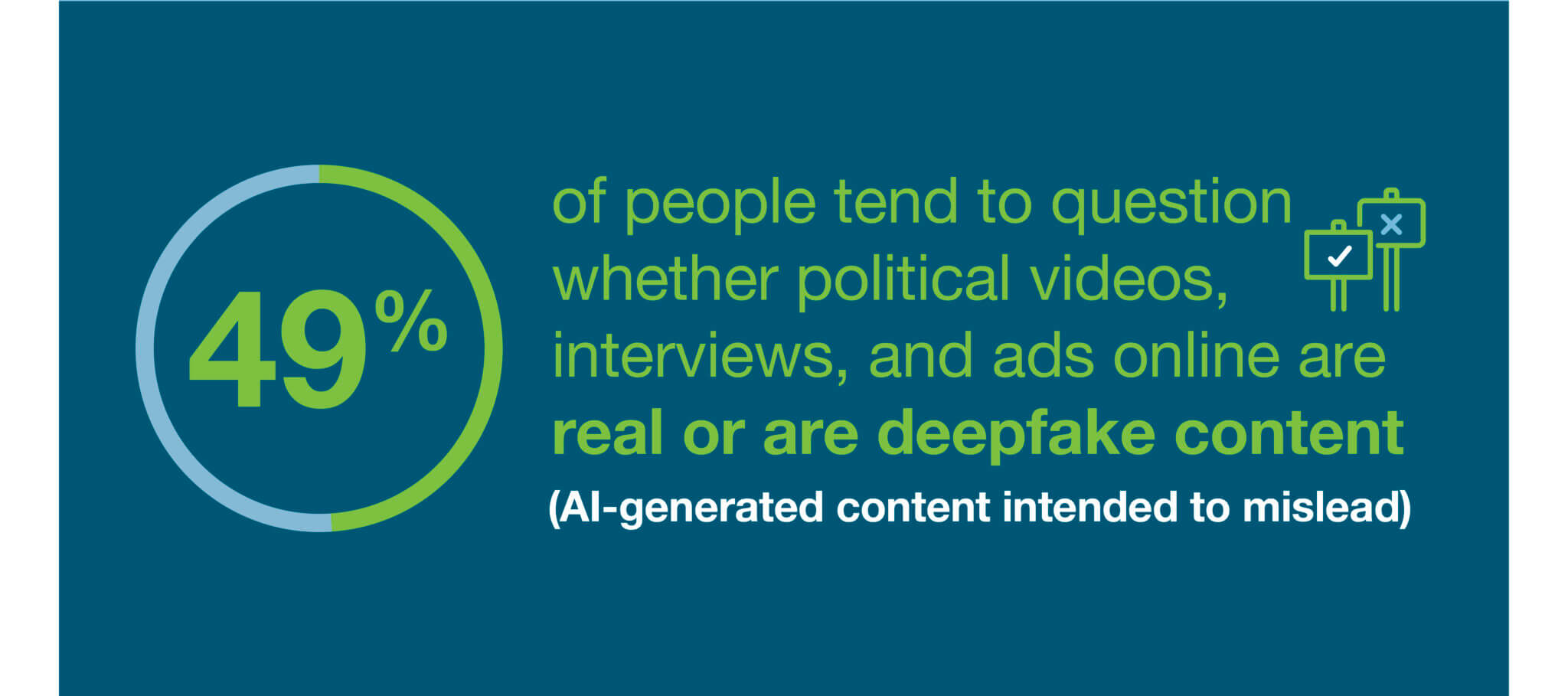Deepfake Elections? 43% Fear AI Will Derail 2024 Presidential Race
As we inch closer to the 2024 elections, unease is growing among American voters — not about the candidates, but about artificial intelligence. A new poll reveals that nearly half of those voters believe AI-generated content will negatively impact the outcome of the presidential race in November (43%).
The survey of 2,000 registered voters reveals not only that people are increasingly pessimistic about a political digital-verse full of deepfakes, but also that people can’t distinguish between AI-generated content and human-created content.
Respondents were asked to differentiate between AI-generated images and human-created images and the majority misidentified all AI images as human-created. On average, only a third of respondents (33%) were able to correctly spot AI-generated images.
Comparisons between AI audio and a human voice were not more promising. When an audio clip with an AI voice was played, a fifth of respondents (20%) were unsure if it was human or AI, while 41 percent believe the AI voice was authentically human.
Commissioned by Yubico, in partnership with Defending Digital Campaigns, and conducted by OnePoll, the survey finds politics is the number one media sector that has been negatively affected by deepfakes (AI-generated content intended to mislead), according to respondents.
Over three-fourths (78%) are worried about AI-generated content being used to impersonate political candidates and spread misinformation and 45 percent say they’re “very concerned” about this issue. Almost half (49%) of respondents tend to question whether political videos, interviews, and ads online are real or are deepfake content. Another seven in 10 are worried that authentic and truthful political information will be lost amongst misinformation online.
“In addition to the threat of AI and deep fakes spreading misinformation, 85 percent of respondents don’t have a high level of confidence that political campaigns effectively protect their personal information,” says spokesperson David Treece, vice president of solutions architecture at Yubico, in a statement.
“This can have detrimental effects on a campaign, as a loss in trust for a campaign could mean voters avoid getting involved with the electoral process, from withholding donations, to even going as far as not voting for the candidate. It’s imperative that candidates take proper steps to protect their campaign and more importantly, to build trust with voters, by adopting modern cybersecurity practices like multi-factor authentication.”
Respondents say their top cybersecurity concerns during the 2024 election season were that a politician they support will be successfully hacked spreading false information and opinions (24%) and that political campaigns don’t take cybersecurity seriously enough in general (24%).
To remedy this, registered voters would like to see campaigns and candidates taking precautions to prevent their websites from being hacked (42%), using strong security measures like multi-factor authentication on their accounts (41%), and creating cybersecurity protocols and staff training (38%).
Only 15 percent have a high level of confidence that political campaigns effectively protect the personal information they collect. In fact, more than two in five respondents (43%) say they’ve shared personal information with a company or organization that’s been hacked.
Of the 60 percent of registered voters who have donated to a political campaign, 42 percent have not completed a donation transaction online due to concern about the security of the transaction and how their personal information would be handled. Nearly a third (30%) doubt that campaigns meet their expectations for implementing cybersecurity standards to protect their personal information.
Public perception in this area has had a big influence on electoral outcomes: 36 percent of respondents say their opinion of a candidate would change if the candidate experienced a cybersecurity incident, like their email being hacked.
Forty-two percent of those who have donated to a campaign say their likelihood of donating again would change if the campaign was hacked and 30 percent report this would even change the likelihood of a candidate receiving their vote.
“Political campaigns are targets for bad actors including nation states, cybercriminals, and hacktivists. Given the high stakes this election year, the risks are even greater,” says spokesperson Michael Kaiser, president and CEO of Defending Digital Campaigns.
“The entire campaign staff — from the candidate down to the volunteers — should understand that they are targets and protect themselves and the campaign with the right cybersecurity tools and technology. Any breach can throw an entire campaign off course and consume precious time as the clock ticks toward election day. As this important poll shows, voters have high expectations about how campaigns protect their information.”
Survey methodology:
This random double-opt-in survey of Americans who are registered to vote was commissioned by Yubico, in partnership with Defending Digital Campaigns, between Feb. 13 and Feb. 18, 2024. It was conducted by market research company OnePoll, whose team members are members of the Market Research Society and have corporate membership to the American Association for Public Opinion Research (AAPOR) and the European Society for Opinion and Marketing Research (ESOMAR).
Source: Study Finds
View Patrisha’s article archive
Image: photo by Edmond Dantès from Pexel
Become a Patron!
Or support us at SubscribeStar
Donate cryptocurrency HERE
Subscribe to Activist Post for truth, peace, and freedom news. Follow us on SoMee, Telegram, HIVE, Minds, MeWe, Twitter – X, Gab, and What Really Happened.
Provide, Protect and Profit from what’s coming! Get a free issue of Counter Markets today.




